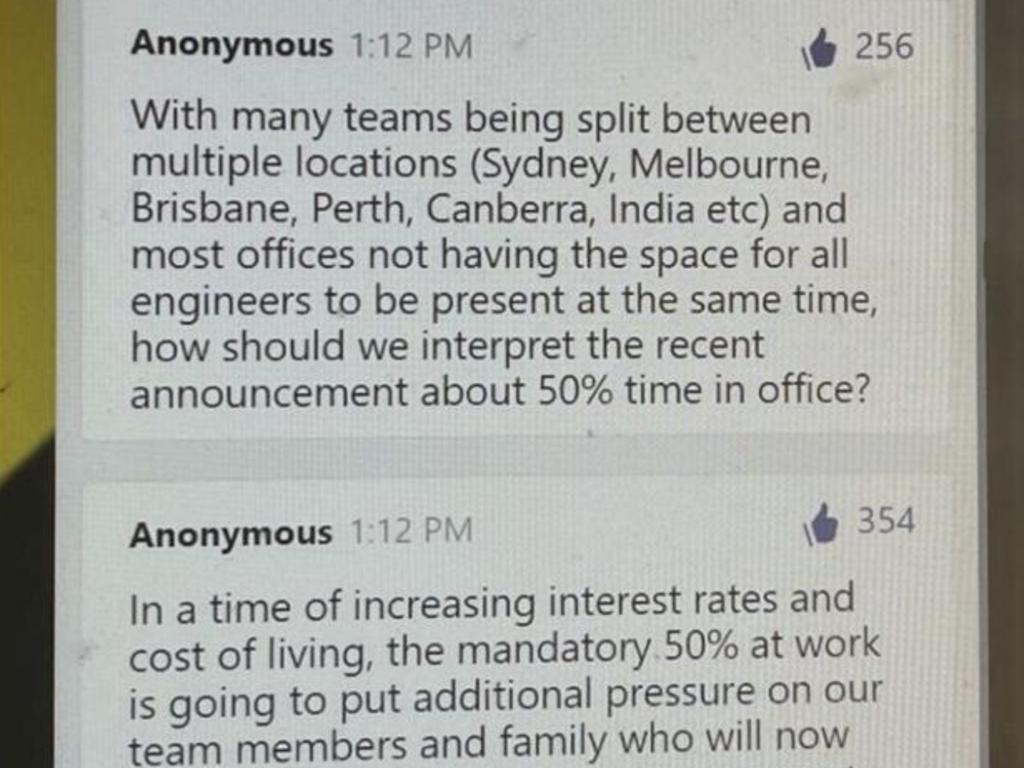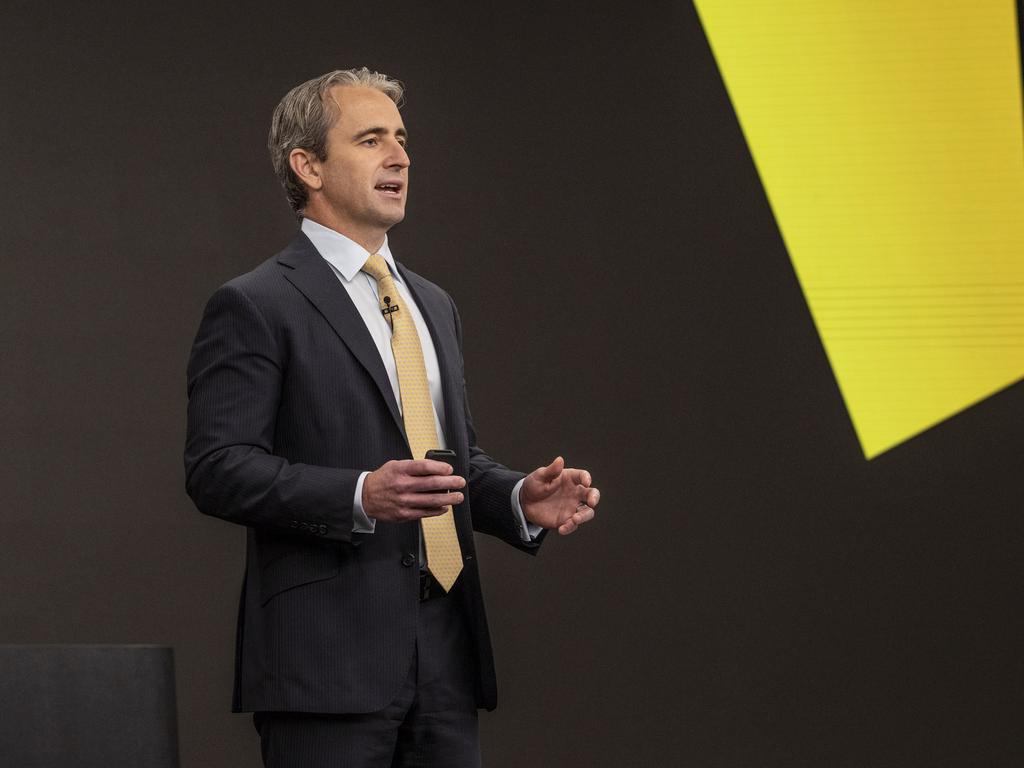‘Get back to work!’: Aussies slam ‘entitled’ CommBank staff in WFH dispute
CommBank staff outraged at being ordered to return to the office have been blasted as “entitled” and “spoilt” by customers.

CommBank staff outraged at being ordered to return to the office at least 50 per cent of the time have been blasted as “entitled” and “spoilt” by customers.
The office mandate was delivered to the bank’s 49,000 employees by chief executive Matt Comyn and his team on Monday.
But the demand sparked outrage among staff, who lashed out at management during an internal town hall meeting held to discuss the changes.
Internal comments were leaked to business gossip Instagram account The Aussie Corporate, which described the meeting as “a bloodbath”.
The anonymous comments posted in the online meeting gained hundreds of ‘thumbs up’ reactions of support.
One said their team agreed “one office day per week is a good balance”, and demanded to know if leaders “will sign their name on forcing teams back to the office”.
On Facebook, however, many readers took the side of CommBank.

“Entitled much! Get back to work and be thankful you have a job,” one man said.
“It’s not axed, they can still WFH 50 per cent of the time. Spoilt people looks like,” another agreed.
“What did you do before you worked at home OMG get back to work,” a third wrote.
One woman said that as a shareholder “I totally support the direction to return to the office” and “I also support replacing staff who don’t want to comply”.
Another woman argued Elon Musk “has it right”. “Enormous amount of jobs cannot be done sitting at home,” she said.
“Should be required in the office 100 per cent of the time. You’re paid to be present at work, not lounging on your couch watching Netflix and doing sweet nothing,” one man wrote.
Several pointed out that many professions did not have the same luxury.
“Maybe the police, ambos, doctors, garbos, truck drivers, food delivery guys could work from home,” one man joked.
“How about these people complain to the essential workers who didn’t take a day off throughout the pandemic and went into their workplaces every day. Working from home is a privilege not a right,” another man said.
“It’s hard to feel sorry for them as an essential worker who had to work through all of it. A little jealous to be honest,” a third woman wrote.
And many suggested the workers might be putting themselves at risk.
“It won’t be long before these companies realise WFH jobs would be cheaper if they send them offshore. Companies could potentially save millions in salaries, easy sell to board and shareholders,” one man said.
Another suggested he “can’t wait for the 500,000-plus immigrants to come to Australia”.
“Likely hard workers prepared to actually do the work they’re being paid to do,” he said.
“Then these WFH at 50 per cent will have something to sook about. Right now it is a nightmare dealing with these large corporations who allow staff to juggle work and life from home during work hours. I really wonder how we managed to survive pre-Covid.”

But a number of readers also supported the workers.
“Everyone I know working from home rarely takes a break and has significantly raised productivity,” one woman said.
“What people don’t understand is that the groups lobbying for return to office typically have expensive business real estate being made increasingly redundant and a decentralised workforce means less people spending in shops they own around business districts. As usual this is the rich stirring up arguments to get the working class arguing amongst themselves to prop up status quo landlords and investors.”
One woman said the move would be bad for workplace morale.
“When has forcing anyone to do something they don’t want to, ever been a good idea?” she asked.
“The flexibility around WFH benefits so much more than the employee, but extends out to the family as well. Disappointing that so many people are actually against this.”
Another man agreed the “days of working in the office five days a week are over”.
“Unless staff are required for face-to-face meetings with management/clients etc. it has been proven over the past two years that WFH can be as productive, or more so, than being in the office,” he said.
“If they stagger the staff to work 50 per cent in the office vs home on different days, it also benefits our overcrowded public transport, and clogged roads networks into the major CBDs.”
Several also raised cost-of-living concerns.
“There’s a cost-of-living crisis and the bank seems to have little awareness of the increased cost of living for its employees in spite of its own record annual profits year after year,” one man said.
“In fact, I can see no reason why staff should return to the office at all. For the people who think that staff will laze in bed all day watching TV and snacking, you really should join the rest of us in the 21st century.”

‘More time connecting’
Speaking to The Australian Financial Review earlier this week, CommBank group executive of human resources Sian Lewis said the bank had “now set the expectation with our office-based people that from mid-July, they will be required to come into the office for at least 50 per cent of their work time per month”.
She said the move was prompted by a decision to drive innovation and collaboration with face-to-face interactions.
“We’ve learnt that on average, we actively connect with 11 more colleagues each day when we are together in the office and spend 20-30 minutes more time collaborating,” she said.
“Our people also spend 40 per cent or more time connecting with their leader and peers when in the office. We have seen that innovation is an outcome of our people physically working together.”
The major bank was forced to follow up on the directive in another email on Tuesday.
“We understand how positively everyone has embraced hybrid working and you will still be able to work from home,” the leadership team said.
“However, as we’ve said before, being together in our corporate offices provides stronger levels of connection, which help us in our own learning, as well as in collaborating to build services for our customers and in sharing and co-developing with our colleagues.”
A CommBank spokesman told news.com.au on Thursday the bank had tried to find the right hybrid working “balance” for staff and its customers.
“Over the past couple of years we’ve spent time testing different working models based on our own insights, regular feedback from our people, and the lessons of other organisations,” he said.

Companies crack down on WFH
CommBank is just the latest large company attempting to crack down on working from home, which became commonplace during the pandemic and has quickly become one of the most important things to employees.
Research from LinkedIn late last year found nearly three quarters of Australian business leaders prefer staff to work from the office.
Tesla boss Elon Musk, who famously hates working from home, said last week employees who did so were living in “la-la land” and insulting those who show up to the office.
That came after Nicole Duncan, chief executive of Australia’s CR Commercial Property Group, branded younger generations “just selfish” for wanting flexible work options.
Last month, NAB chief executive Ross McEwan said he expected senior leaders to return to the bank’s Melbourne headquarters five days a week to set an example for staff, or be prepared to leave the business.
According to The Australian, NAB staff currently spend 1.2 days a week on average in the office, below the bank’s minimum requirement of two to three days.
“Ross has long advocated for the need for teams to be together regularly to collaborate and problem solve for customers,” a spokeswoman told the newspaper.
“NAB is a relationship bank and those relationships are best delivered face-to-face. Ross believes the most senior leaders need to role model the behaviours and culture expected of everyone at NAB.”
And earlier this month, IBM’s global chief executive Arvind Krishna warned the company’s 260,000 staff that while he was not ordering them back to the office yet, those who continued to work remotely would struggle to get promoted.
“Being a people manager when you’re remote is just tough because if you’re managing people, you need to be able to see them once in a while,” he told Bloomberg.
“It seems to me that we work better when we are together in person.”
Some companies like Wall Street giant Morgan Stanley have taken a more blunt approach, ordering employees to come back five days per week or be sacked.
But not every large corporation is choosing to pick a fight with its employees.
In Australia, companies including Telstra, Medibank, NIB and Grant Thornton have embraced hybrid working arrangements.
“We know our people are at their best when they have choice,” Telstra chief executive Vicki Brady told The Australian in January.
“So, there is no talk of returning to previous ways of working at Telstra — we don’t waste time debating who should be in the office and when. We are all-in on hybrid. For us work is a thing you do, not a place you go.”
— with Georgina Noack






